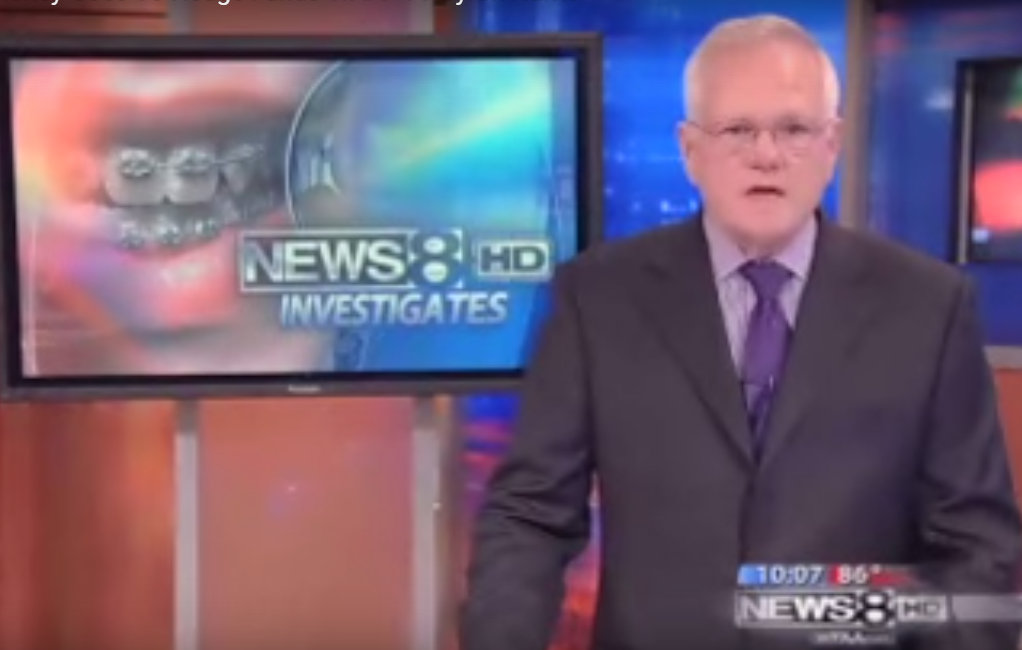 Dallas TV station WFAA is losing its long-time, award-winning investigative reporter Byron Harris to retirement. Harris announced a few weeks ago that he would be leaving the station in October, after spending 40 years with WFAA. It goes without saying he made some enemies during that time.
Dallas TV station WFAA is losing its long-time, award-winning investigative reporter Byron Harris to retirement. Harris announced a few weeks ago that he would be leaving the station in October, after spending 40 years with WFAA. It goes without saying he made some enemies during that time.
Broke the Medicaid ortho story
It was WFAA and Harris that broke, in May of 2011, the original story about the high level of Texas Medicaid orthodontic spending in comparison to other states. Per Harris’ initial story, “Texas spent $184 million on Medicaid orthodontics [in 2010], nine times as much as California, which spent $19.5 million.”
Harris did yeoman work at the beginning in bringing the issue forward although not always getting his facts straight for which he was criticized by his peers.
Uncovered the shady prior authorization process at ACS/Xerox
But his initial story in August of 2011 on ACS/Xerox with his interview of Billy Millwee, former Texas Medicaid director, and his confrontation of ACS/Xerox dental director, Dr. Jerry Felkner, in the ACS/Xerox parking lot in Austin was ground-breaking. It led to Felkner’s resignation.
In November of 2011, Harris continued reporting on ACS/Xerox and that ACS-employees were rewarded for quickly approving Medicaid orthodontic claims because of the company’s “activity-based compensation” system.
A former ACS employee was even interviewed and Harris reported:
In a series of investigative reports over the last several months, News 8 discovered hundreds of millions of dollars in Medicaid billing for orthodontics. Now it appears the problems, which have triggered a federal audit, may be linked as much to the way the claims are approved, as they are to the individual dentists involved.
It turns out that the claims examiners are paid by quantity, and not necessarily quality, under a program called Activity Based Compensation, or ABC. The more claims they process, the more money they make, creating a strong incentive not to take too much time with each one.
“Your tax dollars aren’t working,” said a former claims specialist, one of several News 8 has interviewed. “You’re paying for [dental] services that shouldn’t be paid for.”
However, that is the last heard about Xerox/ACS from WFAA. Harris and WFAA did not even report on the state filing suit against Xerox in May of 2014 for the very things claimed in their November 2011 story.
Pursued dentists even though the facts ultimately didn’t lead there
Unfortunately, the next story that came out after the one on ACS/Xerox in April, 2012, WFAA and Harris unquestioningly reported the allegations of qui tam lawyers Jim Moriarty and Tom Crosley and their client Dr. Christine Ellis that large-scale dental fraud had occurred in Medicaid orthodontic billings. Ellis was testifying before congressional hearings at that time.
While the online video of the story does not mention Moriarty and Crosley, copy which was previously on the website did. TDMR retains a copy of this – Congress examines Texas Medicaid orthodontics.
Three years later, these fraud allegations continue to be unfounded.
Could have uncovered excesses of OIG but did not
Quite frankly, it could be alleged that this unquestioning reporting opened the door to Jack Stick, Doug Wilson and their excesses at OIG (Health and Human Services Commission Office of Inspector General). Their abuses weren’t made public until late last year by the Texas Sunset Advisory Commission and its report.
Stick was hired mid-2012 as the OIG deputy inspector general for enforcement. Both he and Wilson testified numerous times during the 2013 legislative session that there were massive amounts of dental Medicaid fraud in Texas. As a result, they successfully lobbied an increase in the OIG budget for new staff and new Medicaid fraud detection software. This last turned into the 21CT scandal.
In March 2013, Harris was apparently seen at a hearing before a legislative committee talking with Jack Stick. But when Medicaid dentists came to testify before the committee about due process issues and how the unfounded allegations of fraud had hurt them personally, Harris rolled up his camera and walked away.
Harris even attended a March 2013 TDMR meeting in Austin and interviewed Dr. Juan D. Villarreal about his legal case that had gone before the State Office of Administrative Hearings. The SOAH judge had exonerated Dr. Villarreal and his Harlingen Family Dentistry from allegations of fraud and blamed state Medicaid policy for the prior authorization approvals of orthodontic cases.
Harris’ story didn’t highlight this. Instead, his takeaway was that TDMR was about getting dentists their money back from the state rather than real issues of due process, the harm that had been done by loose allegations of Medicaid fraud and a state agency out of control.
Is “uncompromising” a good thing?
In the announcement of Harris’ retirement on the WFAA website, Carolyn Mungo, the executive news director for WFAA, writes Harris “helped set the station apart with his uncompromising style of reporting.”
Being an investigative journalist is not an easy job and society needs them. But perhaps “uncompromising” is not a trait that should be promulgated as ideal.
One should be able to change one’s story when the facts lead in the opposite direction.
We wish Harris a good retirement.


TDMR and the dentists complaining about XEROX’s failure to detect their fraud is like a bank robber blaming the sleeping bank watchman for his robbery of the bank. Byron Harris and the various whistleblowers did more to protect the taxpayers than $200,000,000 worth of OIG costs.
Jack Stick and Doug Wilson said the same thing.